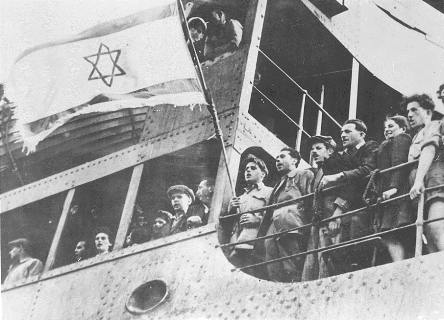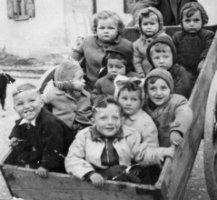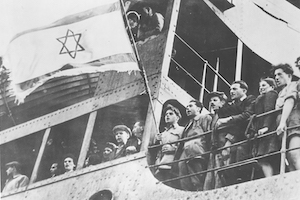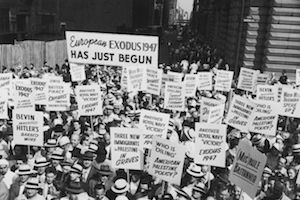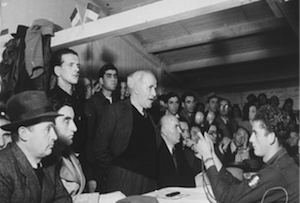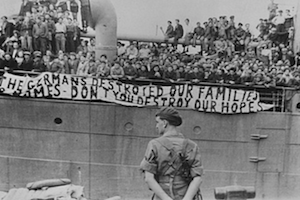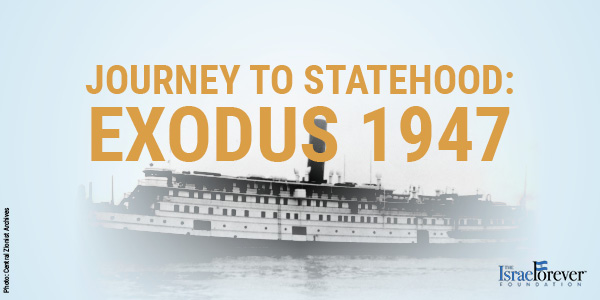Names, Memories And Legacies: The Meaning Of Exodus
The Exodus is a ship with a legacy.
Most people know about Exodus either from the book by Leon Uris, or the film starring the ever-so-sexy Paul Newman as the pioneering young Jewish leader that brought survivors of the Holocaust back to their ancient homeland where they would be allowed to live free. Whichever version one is most familiar with, either one is a distorted version of the reality.
On the 17th of July, 1947, the President Warfield ship being used to transport survivors of the Holocaust from their Displaced Persons camp in France was renamed "Exodus 1947." In the midst of the open sea, the pride of the refugees swelled with the waters as the Zionist blue-white flag with the Star of David was raised and the Hatikvah was sung.
Everyone on board shared the same passion with which that song had been written so many years earlier by Jews who perpetually dreamed of a return to our ancient homeland.
After years of persecution, murder, and dehumanization, the Jews aboard the Exodus and other Aliyah Bet ships were determined to regain their dignity by finding freedom in Palestine, in the Land of Israel.
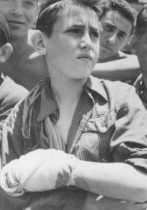
While Leon Uris was blamed as having Americanized Israel for the sake of his fictionalized accounts of the Exodus story, and Otto Preminger for Hollywoodizing it so much that Israel and the characters are stripped of anything resembling reality, both versions provided a much-needed reflection of this dramatic chapter of Jewish history.
This was, indeed, a turning point.
A time at which humanity was at odds with itself over the tragedy of the Holocaust, how could it come to terms with the extermination of millions of Jews under the silent eyes of the nations of the world?
The Exodus represented an opportunity to give voice against the brutality of the British in their treatment of these surviving remnants of a lost world.
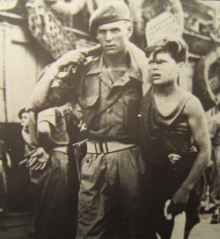
On July 18, the Exodus was rammed and boarded by the British, and 2 passengers and 1 crewman were killed -
William Bernstein, an American Jew from San Francisco who served as first mate;
Mordechai Bunstein, 23, concentration camp survivor, and Hirsh Yacubovitch, 15, having survived from Poland.
Another 27 were wounded in the violent battle and hospitalized after the attack, including
William Millman, 24, from Chelsea, Massachusetts, and survivors Moses Engel, 20; Ernst Weiss, 24; Arien Birnbaum, 24; and Nathan Berkovitch, 71.
There is a certain pride in knowing that there were Americans on board, helping the heroic struggle for the creation of a Jewish State.
They embody the spirit of Zionism as it was embodied in that era: a dream that united Jews from around the world as we faced the stark realization of our need for a national home.
What meaning do these names have now all these years later? We don’t know the names of the other 4,554 men, women and children on board the ship. Their experiences on board the prison ships were captured by Ruth Gruber,the sole journalist allowed to accompany them on their journey back to France and Germany aboard the British caged prison ships.
And the legacy of the experience in the lives of the children of the Exodus is aptly captured in the historical film created by UJA and what became of them after they built their lives in Palestine.
Click here to see the story of the Children of the Exodus.
The value of the Exodus story isn’t in its romanticism. It is in the impact it had on Jews around the world in understanding the need for a Jewish state, the fulfillment of the ancient dream that would soon become reality. It aroused, for many, an understanding of the connection we all share.
“The stand taken aboard the Exodus was a response to a world that didn't even realize a question had been asked; it was a demand, to a world that had forgotten Jews had a right to demand. Decades after the ship was sent back to Germany, I read the story and it changed my life. It sent me on a journey to learn about Israel, about the Holocaust, about my people's history, and ultimately, about myself and my place in this world. It was the first time I learned that such a people existed - beaten and humiliated, starved and persecuted - these people crossed a continent and let nothing stop them to come and help build the land of their forefathers. These survivors came here to make their stand, to tell the world that there was simply no other place for a Jew, here, in Israel.” Paula Stern, A Soldier’s Mother
Leon Uris once wrote about his passion he poured into the book that changed the way the world saw the Jewish People. “There was an aggressiveness and pride about them … and they were always filled with the songs and dances and ideals of the redemption of the homeland … These were the ancient Hebrews! These were the faces of Dan and Reuben and Judah and Ehphraim. These were Samsons and Deborahs and Joabs and Sauls.”
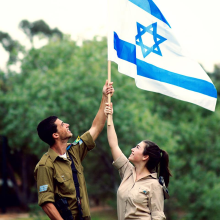
No longer victims, but a national army made up of common individuals ready to fight for the fulfillment of a national dream of freedom.
Today that dream continues to perpetuate as we struggle against a world set out to again dehumanize us, to make us ashamed of our pride as a nation, and turning too many away by emphasizing the political issues that plague the popular understanding of Israel.
But there are still Jews from around the world who see the struggles of Israel as their own, who find a way to use their voice for the sake of our one and only Jewish State, and who feel a connection to her legacy from wherever they may be in the world.
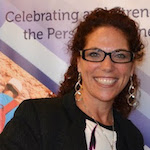
Dr. Elana Yael Heideman, Executive Director of The Israel Forever Foundation, is a dynamic and passionate educator who works creatively and collaboratively in developing content and programming to deepen and activate the personal connection to Israel for Diaspora Jews. Elana’s extensive experience in public speaking, educational consulting and analytic research and writing has served to advance her vision of Israel-inspired Jewish identity that incorporates the relevance of the Holocaust, Antisemitism and Zionism to contemporary issues faced throughout the Jewish world in a continuous effort to facilitate dialogue and build bridges between the past, present and future.
Recommended:
JOURNEY TO STATEHOOD: EXODUS 1947
Learn more about The Exodus 1947 today!
About the Author


